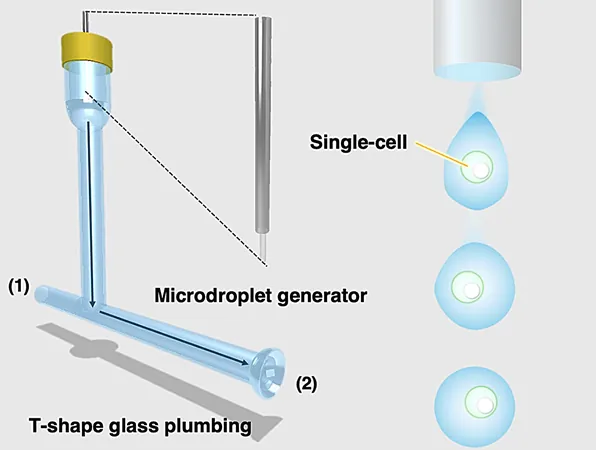
Revolutionary Microdroplet Generator Transforms Single-Cell Analysis of Mammalian Cells!
2025-01-22
Author: Rajesh
Introduction
Trace metals play a fundamental role in the growth and metabolism of all living beings. While essential for organismal stability, humans are increasingly exposed to hazardous heavy metals due to environmental pollution, raising concerns about their impacts on health. As a result, there is a growing demand for advanced analytical techniques to accurately measure the levels of these trace metals within our cells.
Inductively Coupled Plasma Mass Spectrometry (ICP-MS)
One such technique is inductively coupled plasma mass spectrometry (ICP-MS), widely utilized for analyzing elemental compositions in various samples, including biological materials. Recently, the emergence of single-cell ICP-MS (scICP-MS) has revolutionized the medical and biological fields by enabling detailed studies of individual living cells across bacteria, fungi, plants, and now, mammals.
Challenges in Single-Cell Analysis
Traditionally, the scICP-MS method involves a pneumatic nebulizer and a total consumption spray chamber to convert liquid samples into a fine mist. This process proves efficient for simpler organisms like yeast; however, it poses challenges for fragile mammalian cells, which often get damaged during analysis. Chemical fixation techniques can enhance these cells' strength, but they lead to significant alterations in elemental content, compromising accuracy. This predicament underscores the need for a gentler sample introduction system that preserves the integrity of mammalian cells.
Breakthrough Research from Chiba University
In a groundbreaking study, researchers from Chiba University in Japan, led by Assistant Professor Yu-ki Tanaka, have introduced an innovative microdroplet generator (μDG) as a solution. Their findings, published on December 2, 2024, in the Journal of Analytical Atomic Spectrometry, demonstrate that the μDG can serve as a highly effective sample introduction system within ICP-MS, allowing accurate elemental analysis without damaging the cells.
Significance and Methodology
Dr. Tanaka highlights the significance of this advancement: "While scICP-MS has been applied to various cell types, our research successfully extends this technology to mammalian cultured cells, creating a powerful tool for measuring elemental content accurately." The research team tested two sample introduction systems—one traditional, using a concentric glass nebulizer, and another utilizing the μDG integrated into a specialized T-shape glass setup. Results showed a dramatic increase in cell transport efficiency with the μDG, enabling the accurate estimation of crucial trace elements, including magnesium, iron, phosphorus, sulfur, and zinc, in human chronic myelogenous leukemia K562 cells. Unlike traditional methods that often alter cell structure, the μDG maintained cellular integrity, making it a prime candidate for single-cell elemental analysis.
Results and Implications
Notably, the researchers observed that the size of cultured K562 cells affected the shear stress during nebulization, which can lead to cell damage. The μDG mitigates this issue, preserving the cells' structure and ensuring precise detection and measurement of elemental signals. The implications of this research are vast—ICP-MS can be employed across multiple sectors, including environmental monitoring, pharmaceuticals, food safety, agriculture, and clinical research. Its potential for prognosis and diagnosis of diseases is particularly promising, as analyzing the elemental composition within cells can provide critical insights into health conditions.
Conclusion
"By studying blood cell samples from both patients and healthy individuals, scICP-MS can serve as a powerful diagnostic tool for evaluating health on an individual cellular level," concludes Dr. Tanaka. With this groundbreaking innovation, the future of single-cell analytics and disease diagnostics appears much brighter. Keep an eye out for how this technology could revolutionize health care practices!


 Brasil (PT)
Brasil (PT)
 Canada (EN)
Canada (EN)
 Chile (ES)
Chile (ES)
 Česko (CS)
Česko (CS)
 대한민국 (KO)
대한민국 (KO)
 España (ES)
España (ES)
 France (FR)
France (FR)
 Hong Kong (EN)
Hong Kong (EN)
 Italia (IT)
Italia (IT)
 日本 (JA)
日本 (JA)
 Magyarország (HU)
Magyarország (HU)
 Norge (NO)
Norge (NO)
 Polska (PL)
Polska (PL)
 Schweiz (DE)
Schweiz (DE)
 Singapore (EN)
Singapore (EN)
 Sverige (SV)
Sverige (SV)
 Suomi (FI)
Suomi (FI)
 Türkiye (TR)
Türkiye (TR)
 الإمارات العربية المتحدة (AR)
الإمارات العربية المتحدة (AR)